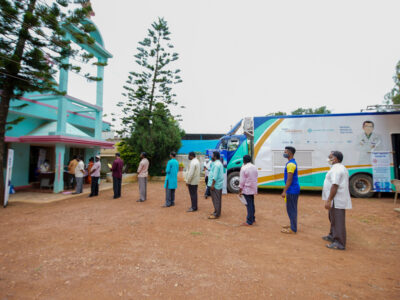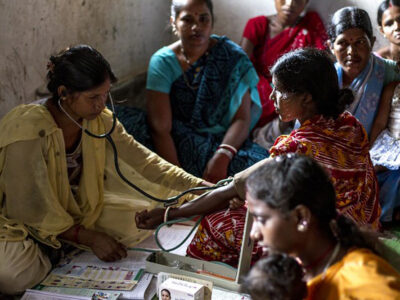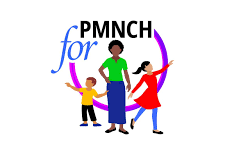Project Info
Project Description
Health and well-being play a vital role in every stage of life, including from birth. The internet has expanded people’s access to health information; however, it is crucial to ensure the accuracy and impartiality of that information. This necessitates robust and reliable evidence, as well as evidence-informed healthcare. It is imperative to prioritize good health and well-being for all individuals and address various significant health concerns, such as reproductive, maternal, child, and adolescent health, both communicable and non-communicable diseases, universal health coverage, and equitable access to safe, effective, quality, and affordable medicines and vaccines.
The COVID-19 pandemic has taught us that outbreaks not only impact the health sector but also have adverse effects on other areas. Low- and middle-income countries (LMICs) often bear the brunt of such diseases, with their populations suffering from a lack of basic and affordable healthcare. Therefore, it becomes even more essential to adopt an evidence-based approach involving multiple disciplines to control and prevent the spread of new diseases that could potentially lead to epidemics. Moreover, increased investments in research and development are necessary to inform sustainable health policies and practices.
Evidence resources on the preparedness for the Pandemic response
Funder: Swedish Research Council

©Trinity Care Foundation
Background
Throughout history, the occurrence and rapid transmission of infectious diseases in the form of pandemics have had a significant impact on humanity and various sectors of development. These pandemics have consistently highlighted the urgent need to identify effective preparedness measures and strong health policies to promptly address and mitigate the detrimental consequences they entail.
The objective of this paper was to create a comprehensive map of available evidence resources pertaining to a specific set of pandemics. By doing so, the paper aimed to prevent redundancy in primary research and identify priority areas for future research endeavors. The intention was to provide an overview of these resources, facilitating a more focused approach towards addressing key research gaps in the field.
Approach
The literature search utilized Google and selected agency websites like WHO, the Centres for Disease Control and COVID-End. A snowballing approach was employed to gather relevant evidence resources.
A total of 802 evidence resources were obtained through the search process. Following a stepwise screening process, 496 resources were deemed relevant and included in the map.
Primary conclusions
- The map reveals an inadequacy of evidence resources for several pandemics, including Nipa and henipaviral diseases, SARS, swine flu (H1N1), Zika, arenaviral haemorrhagic fevers, Chikungunya, Crimean-Congo haemorrhagic fever, Ebola and Marburg, emergent non-polio enteroviruses (including EV71, D668), Hong Kong flu (influenza A/H3N2), and MERS.
- Each of these areas had fewer than 50 evidence resources available, indicating a lack of sufficient evidence and highlighting the need for consolidated research and policy efforts to prepare for the recurrence of these pandemics.
- The majority of the evidence resources focus on transmission, prevention and management, disease burden, and virology. However, significant gaps exist in areas such as social economic impact, behavioral response, gender and equity, health system organization, and evidence systems.
- Research and policy attention should be directed towards these topics as shortcomings in these areas can undermine the effectiveness of therapeutic and preventive measures during pandemics.
- The map provides valuable insights into the strengths and weaknesses of the available evidence system for various pandemics, offering guidance for policy development and areas requiring attention in preparation for the listed pandemics.
Lead Author: Bhumika TV
A scoping review of Economic and financial evaluation for Women, child, and adolescent health
Funder: WHO/PMNCH

©Unicef India
Background
The overall aim of the review is to map the available evidence on economic and financial evaluations of interventions targeted at improving women’s, children’s, and adolescent’s health (WCAH), assess the methodological quality of evidence of the economic evaluation studies and identify gaps in the evidence.
Approach
A protocol
This is an ongoing review
Lead Author- Dr Ashrita Saran
Effect of interventions to support participation in Global Value Chains in Asia and the Pacific: An Evidence and Gap Map
Funder: Asian Development Bank
Background
A Global Value Chain (GVC) is a network of interlinked stages of production for goods and services that straddle international borders. More than 70% of world trade takes place through GVCs, while Asia’s GVC participation is at about 68%. The growth of GVCs has resulted in productivity gains from the increased division of labour, and so powered high levels of growth in income and international trade. Through GVCs, developing countries can provide inputs to the final product through exporting of manufactured goods, aside from unprocessed raw materials.

GVC interventions are intervention by a government or non-governmental agency to facilitate the participation of firms and farms in a GVC. Participation in the GVC is the immediate outcome, which in turn affects enterprise performance and household.
This project will produce two EGMs: a map of effectiveness studies and a map of ADB projects, referred to hereinafter as the effectiveness map and the projects map. The EGMs will contribute and help to establish the range of development knowledge available on interventions that support GVCs and to characterize ADB’s support through its strategies and investments. The EGMs will highlight gaps in the evidence base and show where evidence is more abundant. We will also conduct a ‘formative review’ which focuses on intervention design.
Approach
A protocol
This is an ongoing EGM
Lead Author – Sujata Shirodkar
 |
 |
